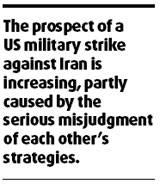US-Iran conflict likely to deepen
By Gao Zugui (China Daily)
Updated: 2008-04-10 07:29
Updated: 2008-04-10 07:29
Iran has begun installing 6,000 new centrifuges at its uranium enrichment plant, President Mahmoud Ahmadinejad said on Tuesday, defying the West which fears Teheran is trying to build nuclear bombs.
As the Bush administration draws closer to the end of its tenure in office, the prospect of a US military strike against Iran is increasing, partly caused by the serious misjudgment of each other's strategies.
The Bush administration, which calibrated its rhetoric about military strikes against Iran in recent months, is getting more agitated about the Iran issue.
The administration considered Iran would be the biggest beneficiary of its toppling of the Saddam government in Iraq and had expected it to behave.

However, contrary to its expectations, Iran, Washington alleges, has tried every means to enhance its influence in Iraq, therefore becoming the biggest obstacle to improving the security situation of that country.
And the US is increasingly concerned about Iran's role in the Israel-Palestine conflict, Lebanon, Afghanistan and even in the Muslim world where Iran is seen as the leader of the Shi'ites.
Such developments, undoubtedly, has set the stage for conflict between the two countries.
And their misreading of each other's strategies may further escalate the conflict, possibly leading to war.
Senior Iranian officials and strategists divide the world into two camps, a "dominating" group led by the US, and the other the "dominated" block comprised of developing countries.
The dominating group, the US in particular, is in decline while the "dominated" block is emerging such as Iran and Venezuela, giving the latter an increasing relative advantage.
The US, trapped in the Iraq quagmire and unlikely to pull out in short term, is in its weakest state, Iranian experts and strategists believe.
Meanwhile, Britain, France and other world powers have their own vested interests in Iran, meaning that they would not fully support US sanctions against the country.
And they even think that US needs Iran's cooperation in issues such as reconstruction in Afghanistan and Iraq.
And Iran, taking advantage of the rift between the world powers and its cooperation with International Atomic Energy Agency, is protracting the issue to gain time to research nuclear technology.
It is also improving relations with Arab countries and enhancing ties with India and Venezuela to expand its regional and international influence, creating a favorable external environment to counter the US.
Under such circumstances, the US, the Iranian strategists say, cannot impose effective sanctions against Iran and therefore a US military strike is definitely out of the question.
They say that the Democrats, if they claim the White House this year, will adopt a different policy toward Iran.
Guided by such thinking, Teheran continues to pursue a hostile and unyielding stance when dealing with Washington.
However, in the US, where the Republicans view Iran as a realistic threat, the policy of the Democrats is not expected to be vastly different.
For example, Democrat presidential hopeful Hillary Clinton, who has advocated using diplomatic and political solutions to resolve the Iran issue, has not ruled out the possibility of a military strike.
Such serious misjudgment of each other's strategies, coupled with the intensifying standoff between the two sides, can only add fuel to the tense situation and significantly increase the possibility of the US launching a military strike against Iran.
Against this backdrop, the Bush administration, with its remaining days in office, has three strategic options to deal with Iran.
First, Washington should try to reach a compromise with Teheran.
Under such scenario, the US should acknowledge Iran as a big power in the Middle East region and embark on diplomatic talks with Teheran to resolve issues that are troubling both, such as the rebuilding of Iraq, and Iran's security.
But this option, however, seems highly unlikely to be adopted given the reality on the ground.
Second, the US could continue its seemingly strategic containment of Iran, a policy that has been followed in the past three decades.
Currently, Washington's many policy initiatives seem to point this way. The US, for example, is committed to offering $30 billion in military aid to Israel from 2009 to 2018. And it is still trying to settle the Iran nuclear issue through a diplomatic and political framework.
Third, the last resort is a military strike against Iran.
Although the other two options seem more realistic and safer, they need time and patience to realize.
But as diplomatic and political solutions to resolve the stand-off seems to be going nowhere, the possibility of a military attack is on the rise.
And even if Washington is to fully adopt the containment policy, it may still resort to a military strike to debilitate Teheran's military power.
The author is deputy director of the Institute of Security and Strategy under China Institutes of Contemporary International Relations The article first appeared in the journal Peace and Development
(China Daily 04/10/2008 page9)
|
|
|
|